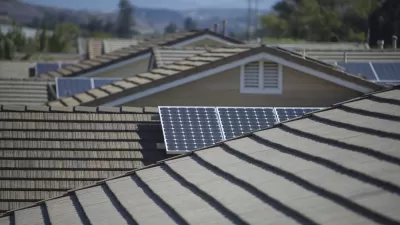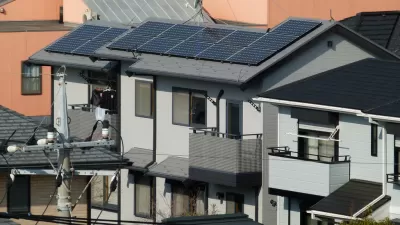Utilities and regulators should be looking forward, not backward, to find ways to invest in progress, rather than trying desperately to cling to yesterday's business model, which is based on encouraging consumption of polluting sources of energy.
Kaid Benfield offers up a review of what's happening with net metering of solar in the United States, and cautions us that it's getting political. "'US solar power grew by 6.2 gigawatts in 2014, a 30 percent increase over the previous year and representing nearly $18 billion in new investment,' according to data released last month by the Solar Energy Industries Association and GTM Research, reported by Daniel Cusick for ClimateWire and reprinted in Scientific American. A similar amount of growth is projected for 2015, adds Cusick, because of 'falling costs for solar panels and modules, business model innovation that allows for more flexibility in ownership, favorable political and regulatory environments, and increased access to low-cost capital.' Solar accounted for nearly a third of the nation’s new generating capacity in 2014, more than either coal or wind (though less than natural gas)."
"Unfortunately, it seems that whenever there is progress, there’s opposition. Some fossil-fuel-based utilities are getting uptight about losing market share, according to an article written by Joby Warrick and published in the Washington Post. Determined to slow the growth of solar, the companies have persuaded authorities in Arizona and Wisconsin to slap a monthly surcharge on consumers for the practice of 'net metering' described by Peter Murtha. They are targeting additional states, and Warrick reports that 'in some states, industry officials have enlisted the help of minority groups in arguing that solar panels hurt the poor by driving up electricity rates for everyone else.'"
FULL STORY: Household Solar Popularity Builds, As Does Utility Industry Discomfort

Alabama: Trump Terminates Settlements for Black Communities Harmed By Raw Sewage
Trump deemed the landmark civil rights agreement “illegal DEI and environmental justice policy.”

Study: Maui’s Plan to Convert Vacation Rentals to Long-Term Housing Could Cause Nearly $1 Billion Economic Loss
The plan would reduce visitor accommodation by 25% resulting in 1,900 jobs lost.

Planetizen Federal Action Tracker
A weekly monitor of how Trump’s orders and actions are impacting planners and planning in America.

This Toronto Suburb Has More Bus Riders Than Columbus, Ohio
Brampton, Ontario used gradual improvements in service to prove that if you build it, they will ride.

Paris Bike Boom Leads to Steep Drop in Air Pollution
The French city’s air quality has improved dramatically in the past 20 years, coinciding with a growth in cycling.

Why Housing Costs More to Build in California Than in Texas
Hard costs like labor and materials combined with ‘soft’ costs such as permitting make building in the San Francisco Bay Area almost three times as costly as in Texas cities.
Urban Design for Planners 1: Software Tools
This six-course series explores essential urban design concepts using open source software and equips planners with the tools they need to participate fully in the urban design process.
Planning for Universal Design
Learn the tools for implementing Universal Design in planning regulations.
Smith Gee Studio
Alamo Area Metropolitan Planning Organization
City of Santa Clarita
Institute for Housing and Urban Development Studies (IHS)
City of Grandview
Harvard GSD Executive Education
Toledo-Lucas County Plan Commissions
Salt Lake City
NYU Wagner Graduate School of Public Service




























